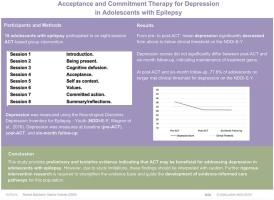Acceptance and commitment therapy for depression in adolescents with epilepsy
IF 2.3
3区 医学
Q2 BEHAVIORAL SCIENCES
引用次数: 0
Abstract
Background
Adolescents with epilepsy are at increased risk of depression. One psychological intervention with a growing evidence base in physical health populations is acceptance and commitment therapy (ACT), yet its effectiveness on depression in adolescents with epilepsy has not yet been investigated.
Aims
This study aimed to evaluate the effectiveness of an ACT-based group intervention in reducing symptoms of depression in adolescents with epilepsy. It also aimed to assess if any reductions in depression were maintained at six-month follow-up.
Methods
Eighteen adolescents (aged 13–17-years-old) with epilepsy completed an eight-session ACT group intervention. Adolescents completed the Neurological Disorders Depression Inventory for Epilepsy − Youth (NDDI-E-Y) pre-ACT, post-ACT, and at six-month follow-up.
Results
Significant pre- to post-ACT reductions were found in symptoms of depression. At post-ACT and six-month follow-up, 77.8 % of adolescents no longer met clinical threshold for depression. Such effects were maintained at six-month follow-up.
Clinical implications
This study offers preliminary evidence indicating that ACT may be beneficial for addressing depression in adolescents with epilepsy. However, given the study limitations, these findings should be interpreted with caution, and further rigorous intervention research is required to strengthen the evidence base and guide the development of evidence-informed care pathways for this population.

青少年癫痫患者抑郁的接受与承诺治疗
背景:青少年癫痫患者患抑郁症的风险增加。接受和承诺疗法(ACT)是一种心理干预措施,在身体健康人群中有越来越多的证据基础,但其对青少年癫痫患者抑郁症的有效性尚未得到调查。目的:本研究旨在评估基于act的群体干预在减轻青少年癫痫患者抑郁症状方面的有效性。它还旨在评估在六个月的随访中是否能保持抑郁的减少。方法18例青少年癫痫患者(13 - 17岁)完成8期ACT组干预。青少年在act前、act后和6个月随访时完成了癫痫-青少年神经障碍抑郁量表(NDDI-E-Y)。结果act治疗前后抑郁症状明显减轻。在act后和六个月的随访中,77.8%的青少年不再达到抑郁的临床阈值。这种效果在六个月的随访中保持不变。临床意义本研究提供了初步证据,表明ACT可能有助于解决青少年癫痫患者的抑郁问题。然而,考虑到研究的局限性,这些发现应该谨慎解释,需要进一步严格的干预研究来加强证据基础,并指导针对这一人群的循证护理途径的发展。
本文章由计算机程序翻译,如有差异,请以英文原文为准。
求助全文
约1分钟内获得全文
求助全文
来源期刊

Epilepsy & Behavior
医学-行为科学
CiteScore
5.40
自引率
15.40%
发文量
385
审稿时长
43 days
期刊介绍:
Epilepsy & Behavior is the fastest-growing international journal uniquely devoted to the rapid dissemination of the most current information available on the behavioral aspects of seizures and epilepsy.
Epilepsy & Behavior presents original peer-reviewed articles based on laboratory and clinical research. Topics are drawn from a variety of fields, including clinical neurology, neurosurgery, neuropsychiatry, neuropsychology, neurophysiology, neuropharmacology, and neuroimaging.
From September 2012 Epilepsy & Behavior stopped accepting Case Reports for publication in the journal. From this date authors who submit to Epilepsy & Behavior will be offered a transfer or asked to resubmit their Case Reports to its new sister journal, Epilepsy & Behavior Case Reports.
 求助内容:
求助内容: 应助结果提醒方式:
应助结果提醒方式:


